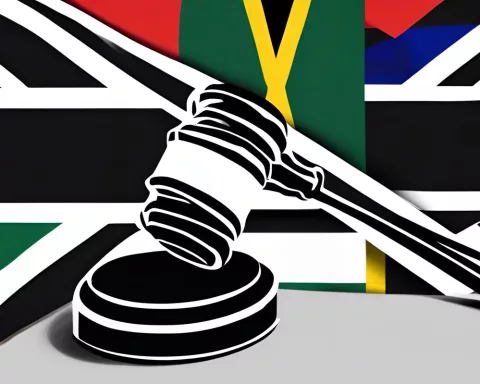Zahara, a beloved Afropop star from South Africa, passed away and left the nation and the music industry in grief. Her rise to fame was accompanied by allegations of exploitation by her former record label executives, DJ Sbu and TK Nciza, leading to a bitter feud that remained unresolved. Zahara’s legacy highlights the need for transparency, fairness, and respect for artists’ rights within the music industry and serves as a call for reform. Her story underscores the importance of treating artists equitably and preserving their rights.
Zahara’s sudden death has left South Africa in shock and reignited the controversy surrounding her fraught relationship with DJ Sbu and TK Nciza. The conflict arose over allegations of exploitation by her then-record label executives, giving birth to a bitter feud that remained unresolved. Zahara’s legacy stands as a testament to the dire need for transparency, fairness, and respect for artists’ rights within the music industry. Her tragic story serves as a clarion call for the industry to reflect on its practices and carve out a safer, more balanced path for emerging artists.
The unexpected demise of South Africa’s beloved Afropop star, Zahara, has left the nation and the music industry in a state of stunned grief. Known by her real name, Bulelwa Mkutukana, Zahara’s untimely departure was announced by Zizi Kodwa, Minister of Sports, Arts, and Culture. Kodwa voiced his deep sadness on behalf of the entire nation. This heartbreaking news has sent tremors through South Africa and has reignited the controversy surrounding Zahara’s fraught relationship with businessmen DJ Sbu and TK Nciza.
Zahara’s Rise to Stardom and Challenges Along the Way
From her humble beginnings in a small South African village, Zahara burst onto the national music scene with her debut album ‘Loliwe’. The album was a resounding success, selling over half a million copies and earning Zahara a slew of awards. Zahara’s unique voice and soulful tunes, often accompanied by her playing the guitar, left an indelible mark on the South African music landscape. However, beneath the shimmering surface of her successful career, Zahara was embroiled in disagreements and allegations of exploitation by her then-record label executives.
Zahara’s contentious relationship with DJ Sbu and TK Nciza, her former bosses at TS Records, became the subject of public discussion following her death. The conflict came to light when Zahara claimed that she had been exploited by DJ Sbu and Nciza, alleging that she had not been paid royalties for the remarkable sales of her debut album. In response, DJ Sbu, also known as Sibusiso Leope, dismissed Zahara’s allegations, asserting that Zahara had received her rightful share from the album’s success. This dispute gave birth to a bitter feud that seemed far from being resolved.
A Bitter Feud and Financial Hardships
The feud between Zahara and DJ Sbu remained a subject of public interest, with both parties exchanging accusations. Zahara argued that her music had been uploaded to digital platforms without her consent, implying that her records were sold without her knowledge. She believed she deserved a portion of the sales revenue. In his defense, DJ Sbu countered that he had worked hard to build his career and had never intended to exploit Zahara’s success for his personal gain.
Zahara’s strained relationship with her former record label executives became more evident during her financial difficulties last year. As she verged on losing her Roodeport townhouse, Zahara laid the blame at the feet of DJ Sbu and Nciza, claiming that her financial woes were a direct result of their actions. Zahara disclosed that TS Records owed her millions of rands. She asserted that despite her booking fee being between R80 000 and R120 000, she was only given R15 000, further stoking the controversy.
Zahara’s Legacy and a Call for Industry Reform
Zahara’s sudden departure has reignited discussions about the exploitative practices prevalent in the music industry. Some social media users have suggested that DJ Sbu and TK Nciza took advantage of Zahara’s trust and innocence, leading her to sign a contract that she did not fully comprehend. Zahara’s struggle with depression and alcoholism is also believed to have stemmed from her ongoing battles with her former bosses.
The tragic circumstances of Zahara’s death have once again spotlighted the often harsh realities of the music industry. Her life and career serve as a stark reminder that beneath the glitz and glamour of fame and success lie complex challenges and darker truths. Zahara, who made some unforgettable music and had a massive impact on South African music, will be remembered for her extraordinary talents. However, her legacy also stands as a testament to the dire need for transparency, fairness, and respect for artists’ rights within the industry.
As the nation mourns the loss of this musical icon, it is hoped that Zahara’s tragic story will catalyze much-needed reforms within the industry. Her life underscores the urgency for change, paving the way for artists to be treated equitably and ensuring that their rights are preserved. Zahara’s story serves not only as a narrative of an artist’s rise and fall but also as a clarion call for the music industry to reflect on its practices and carve out a safer, more balanced path for emerging artists.
Who is Zahara?
Zahara, whose real name is Bulelwa Mkutukana, was a beloved Afropop star from South Africa who rose to fame with her debut album ‘Loliwe’. She had a unique voice and soulful tunes, often accompanied by her playing the guitar, that left an indelible mark on the South African music landscape.
What was Zahara’s relationship with DJ Sbu and TK Nciza?
Zahara’s contentious relationship with DJ Sbu and TK Nciza, her former bosses at TS Records, became the subject of public discussion following her death. The conflict arose over allegations of exploitation by her then-record label executives, giving birth to a bitter feud that remained unresolved.
What were Zahara’s financial difficulties?
As she verged on losing her Roodeport townhouse, Zahara laid the blame at the feet of DJ Sbu and Nciza, claiming that her financial woes were a direct result of their actions. Zahara disclosed that TS Records owed her millions of rands. She asserted that despite her booking fee being between R80 000 and R120 000, she was only given R15 000.
What does Zahara’s legacy stand for?
Zahara’s legacy stands as a testament to the dire need for transparency, fairness, and respect for artists’ rights within the music industry. Her tragic story serves as a clarion call for the industry to reflect on its practices and carve out a safer, more balanced path for emerging artists.
What does Zahara’s death reignite?
Zahara’s sudden death has reignited discussions about the exploitative practices prevalent in the music industry. Some social media users have suggested that DJ Sbu and TK Nciza took advantage of Zahara’s trust and innocence, leading her to sign a contract that she did not fully comprehend.
What is the music industry expected to do after Zahara’s death?
As the nation mourns the loss of this musical icon, it is hoped that Zahara’s tragic story will catalyze much-needed reforms within the industry. Her life underscores the urgency for change, paving the way for artists to be treated equitably and ensuring that their rights are preserved.












